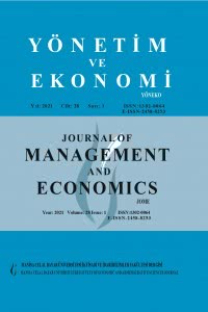Industrial Revolution: Impetus Behind the Globalization Process
Son birkaç on yıldır güçlü bir sekilde tecrübe etmeye basladıgımız küresellesme sürecinin kökenine iliskin birçok iddia bulunmaktadır. Ancak, bunların pek azı sanayi devriminin sahip oldugu etkilere deginir. Bu çalısmada, sanayi devrimi ile küresellesme süreci arasında dogrudan bir bag kurmaya çalısacagım. Bu amaca yönelik olarak, sanayi devrimi sonrasında Avrupa’da yasanan dönüsümler; kapitalist üretim sekli, pazarlama ve tüketim çerçevesinde gözden geçirilecektir. Sonuç olarak, küresellesme sürecinin arkasındaki en önemli faktörlerden birinin sanayi kapitlizmine yol veren sanayi devrimi oldugunu göstermeye çalısacagım.
Sanayi Devrimi: Küreselleşme Sürecinin Arkasındaki İtici Güç
There are many arguments related to the origins of globalization process that we are more blatantly experiencing for the last few decades. But few of them focus on the effects of industrial revolution. In this paper, I will try to set a direct connection between industrial revolution and globalization process. For this aim, transformations as a result of industrial revolution in Europe will be reviewed within the context of capitalist mode of production, marketing and consumption. Thus, I will argue that industrial revolution that resulted in the emergence of industrial capitalism is one the most important factors behind globalization.
___
- ALBROW, M., King, E. (1990), Globalization, Knowledge and Society, London: Sage.
- AMIN, Samir (1997), Capitalism in the Age of Globalization, London: Zed Books.
- ANDERSON, Perry (1974), Lineages of Absolutist State, London: Verso.
- BAIROCH, P. (1982), ‘‘International Industrialisation Levels from 1750 to 1980’’, Journal of European Economic History, 2, 268-333.
- BAIROCH, P. (1993), Economics and World History, London: Harvester-Wheatsheaf.
- BIRNIE, Arthur M.A. (1953), An Economic History of Europe, London: Methuen.
- BLANQUI, Jerome Adolphe (1968), History of Political Economy in Europe (translated by Emily J. Leonard), New York: Agustus M. Kelley.
- BRAUDEL, F. (1984), Civilisation and Capitalism, 15th-18th Century: The Perspective of the World, Vol. 3, New York: Harper and Row.
- CLARK, Ian (1997), Globalization and Fragmentation: International Relations in the 21. Century, Oxford: Oxford University Press.
- CRAFT, N. (1989), ‘‘British Industrialisation in an International Context’’, Journal of Interdisciplinary History, 19, 415-28.
- DEANE, Phyllis (1965), The First Industrial Revolution, New York: Cambridge University Press.
- FARNEN, F. Russell (1994), ‘‘Nationalism, Ethnicity, National Identity and Multiculturalism: Concluding Observations’’. In Russel F. Farnen (ed.), Nationalism, Ethnicity and Identity, New Brunswick: Translation Publishers.
- FRIEDMAN, Jonathan (1992), ‘‘Global System, Globalization and the Parameters of Modernity’’. In Mike Feathersone, Scott Lash, Roland Robertson (eds.), Global Modernities, London: Sage.
- GIDDENS, Anthony (1990), The Consequences of Modernity, Standford: Standford University Press.
- GILL, Stephen (2000), ‘‘Globalization, Market, Civilization, and Disciplinary Liberalism’’. In Andrew Linklater (ed.), International Relations: Critical Concepts in Political Science, London: Routledge.
- GOULET, Denis (2002), ‘‘Inequalities in the Light of Globalization’’, Kroc Institute Occasional Paper, No 22:OP:2, University of Notre Dame.
- GREENFIELD, Liah (2001), The Spirit of Capitalism, Nationalism and Economic Growth, Harvard: Harvard University Press
- GREIDER, W. (1997), One World Ready or Not: The Manic Logic of Global Capitalism, New York: Simon&Schuster.
- HENDERSON, W.O. (1961), Industrial Revolution on the Continent, London: Frank Casss&Co. Ltd..
- HILL, Christopher (1969), Reformation to Industrial Revolution, England: Penguin Books.
- HOBSBAWM, E.C. (1962), The Age of Revolution:1789-1848, New York: A Mantor Book.
- HOBSBAWM, E.C. (1968), Industry and Empire, New York: Pantheon Books.
- HOBSBAWM, E.C. (1977), The Age of Capital:1848-1875, London: ABACUS.
- INGLEHART, Ronald (2000), ‘‘Globalization and Post Modern Values’’, The Washington Quarterly, 23 (1), 215-28.
- KOENIGSBERGER, H.G. (1987), Early Modern Europe, New York: Longman.
- MARTIN, Roger and Gordon Nixon (2007), ‘‘A Prescription for Canada: Rethink Our Tax Policy’’, Globe and Mail, July 1 2007.
- O’ROURKE, Kevin H. (2002), ‘‘Europe and the Causes of Globalization 1790-2000’’, in H. Kierzkowski (ed.), From Europeanization of the Globe to the Globalization of Europe, London: Palgrave.
- POLANYI, Karl (1957), The Great Transformation, Boston: Beacon Press.
- SCHOLTE, Jan Aart (2000), Globalization, A Critical Introduction, New York: St. Martin’s Press.
- ROBERTSON, Roland (1992), Globalization: Social Theory and Global Culture, London: Sage.
- ROSTOW, W.W. (1960), The Stages of Economic Growth: A Non-Communist Manifesto, Cambridge: Cambridge University Press.
- SCOTT, A. (1997), The Limits of Globalization: Case and Arguments, London: Routledge.
- TAYLOR, A. (1996), ‘‘International Capital Mobility in History: The Savings-Investment Relationship’’, NBER Working Paper No. 5743.
- THOMSON, Allan (1973), The Dynamics of Industrial Revolution, London: Edward Arnold Publisher.
- TILLY, Charles (1984), Big Structures Large Processes Huge Comparisons, New York: Russel Sage Foundation.
- TILLY, Charles (1992), Coercion Capital and European States, Oxford: Blackwell.
- TILLY, Charles (1993), European Revolutions: 1492-1992, Oxford: Blackwell.
- WALLERSTEIN, Immanuel (1974), The Modern World System, New York: Academic Press.
- WESSELING, H.L. (1997), Imperialism and Colonialism: Essays on the History of European Expansion, Connecticut: Greenwood Press.
- VAYRYNEN, Raimo (1991), Global Transformation, Economics, Politics, And Culture, Helsinki:
- SITRA (The Finnish National Fund for Research and Development).
- VON WERLHOF, Claudia (2000), ‘‘Globalization and the Permanent Process of Primitive Accumulation’’, Journal of World-Systems Researches, 6 (3), 728-47.
- ZERVIN, R. (1992), ‘‘Are World Financial Markets More Open?’’, In T. Banuri and J. Schor (eds.), Financial Openness and National Autonomy, Oxford: Oxford University Press.
- ISSN: 1302-0064
- Yayın Aralığı: Yılda 4 Sayı
- Yayıncı: Manisa Celal Bayar Üniversitesi İktisadi ve İdari Bilimler Fakültesi
Sayıdaki Diğer Makaleler
Hulusi DOĞAN, Gürhan UYSAL, İsa İPÇİOĞLU
Kamusal Mallar Teorisinin Değişimi: Bölgesel Kamusal Mallar
A.kemal ÇELEBİ, Zafer YALÇIN, A. Zafer YALÇIN
A Research Study For Procedural Justice as a Factor in Employee Retention
Industrial Revolution: Impetus Behind the Globalization Process
Örgütsel İletişim İklimi ve İş Tatmininin Çalışanların Kurumsal İtibar Algıları Üzerindeki Etkileri
Sema POLATÇI, Rıfat KAMAŞAK, Kadir ARDIÇ, Füsun BULUTLAR, Adem KAYA
Murat ÇETİN, Mehmet KAŞLI, Eyyup ECEVİT, Alpaslan SEREL
SANAYİ DEVRİMİ: Küreselleşme Sürecinin Arkasındaki İtici Güç
Gürhan UYSAL, Davut ATEŞ, İsa İPÇİOĞLU
İşgöreni Örgütte Tutma Aracı Olarak Prosedürel Adalete İlişkin Bir Araştırma Çalışması
